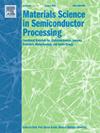Exploring topological phases in superconducting transition metal (Sc, Ti, V)-carbides
IF 4.2
3区 工程技术
Q2 ENGINEERING, ELECTRICAL & ELECTRONIC
引用次数: 0
Abstract
The combination of non trivial band topology and superconductivity, resulting in topological superconductivity, igniting a fervent pursuit in the realm of quantum materials. Through density functional theory and maximally localized Wannier functions, we delve into the electronic and topological properties of transition metal carbides C (with Sc, Ti, V). Phonon dispersions guarantee the structural stability of these superconductors. Witness the presence of band inversion within the Brillouin Zone of TiC and VC, contrasting the absence of such band inversion in ScC. In addition, the nonzero topological invariant as well as the occurrence of Dirac cone in the surface spectrum of TiC and VC, unveil their topologically nontrivial character. These transition metal carbides emerge as promising candidates for probing the depths of topological superconductivity and unraveling the associated Majorana bound states.
探索超导过渡金属(Sc、Ti、V)碳化物中的拓扑相位
非琐碎带拓扑与超导性的结合,导致了拓扑超导,点燃了量子材料领域的热切追求。通过密度泛函理论和最大局域万尼尔函数,我们深入研究了过渡金属碳化物ΛC(Λ= Sc、Ti、V)的电子和拓扑特性。声子色散保证了这些超导体的结构稳定性。我们可以看到 TiC 和 VC 的布里渊区内存在带反转,而 ScC 则不存在这种带反转。此外,非零 Z2 拓扑不变性以及 TiC 和 VC 表面谱中出现的狄拉克锥,揭示了它们的拓扑非三维特性。这些过渡金属碳化物有望成为探测拓扑超导电性深度和揭示相关马约拉纳束缚态的候选材料。
本文章由计算机程序翻译,如有差异,请以英文原文为准。
求助全文
约1分钟内获得全文
求助全文
来源期刊

Materials Science in Semiconductor Processing
工程技术-材料科学:综合
CiteScore
8.00
自引率
4.90%
发文量
780
审稿时长
42 days
期刊介绍:
Materials Science in Semiconductor Processing provides a unique forum for the discussion of novel processing, applications and theoretical studies of functional materials and devices for (opto)electronics, sensors, detectors, biotechnology and green energy.
Each issue will aim to provide a snapshot of current insights, new achievements, breakthroughs and future trends in such diverse fields as microelectronics, energy conversion and storage, communications, biotechnology, (photo)catalysis, nano- and thin-film technology, hybrid and composite materials, chemical processing, vapor-phase deposition, device fabrication, and modelling, which are the backbone of advanced semiconductor processing and applications.
Coverage will include: advanced lithography for submicron devices; etching and related topics; ion implantation; damage evolution and related issues; plasma and thermal CVD; rapid thermal processing; advanced metallization and interconnect schemes; thin dielectric layers, oxidation; sol-gel processing; chemical bath and (electro)chemical deposition; compound semiconductor processing; new non-oxide materials and their applications; (macro)molecular and hybrid materials; molecular dynamics, ab-initio methods, Monte Carlo, etc.; new materials and processes for discrete and integrated circuits; magnetic materials and spintronics; heterostructures and quantum devices; engineering of the electrical and optical properties of semiconductors; crystal growth mechanisms; reliability, defect density, intrinsic impurities and defects.
 求助内容:
求助内容: 应助结果提醒方式:
应助结果提醒方式:


